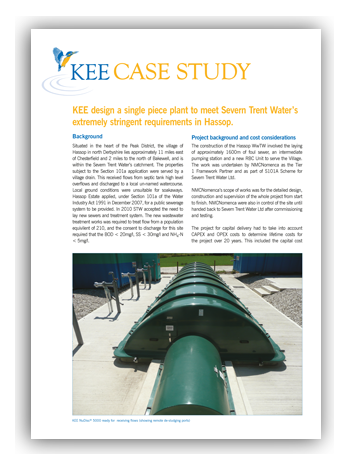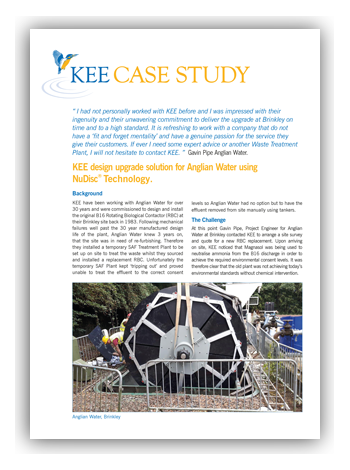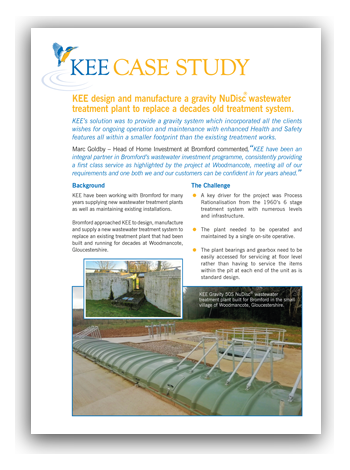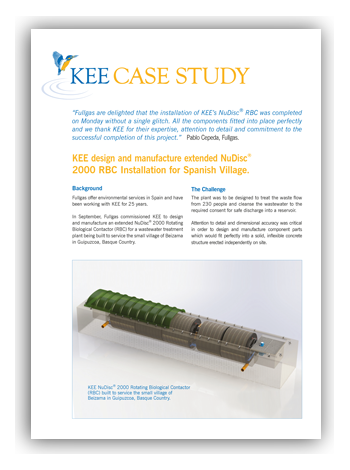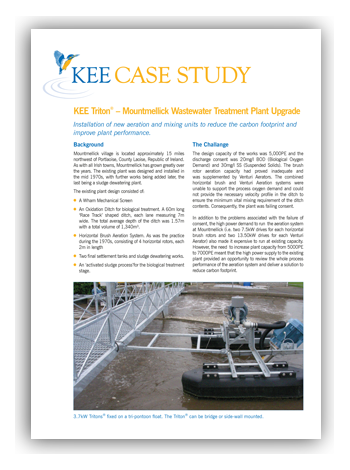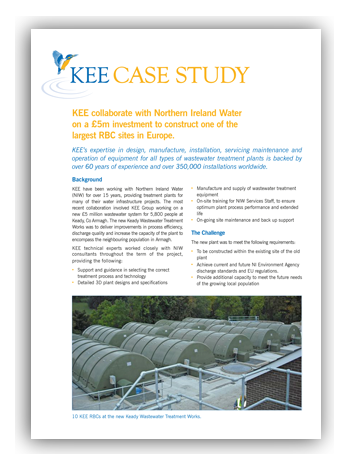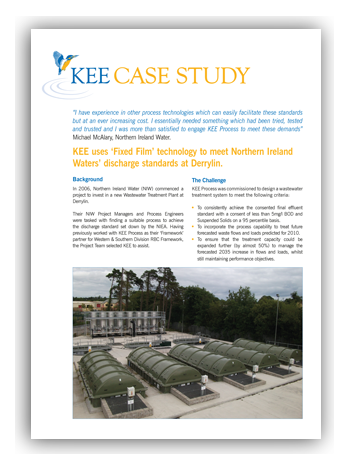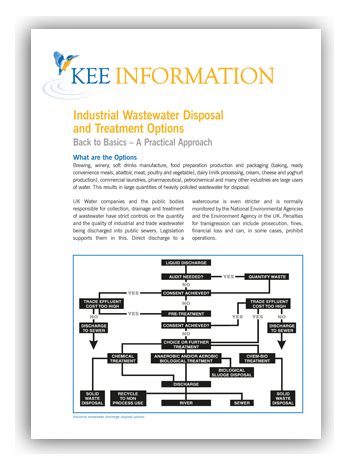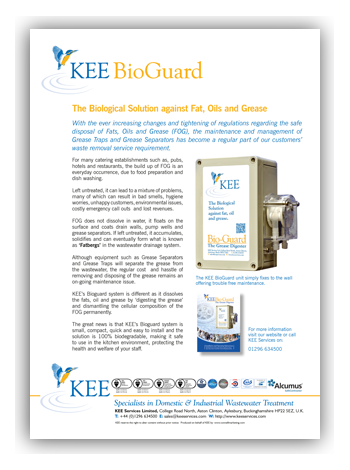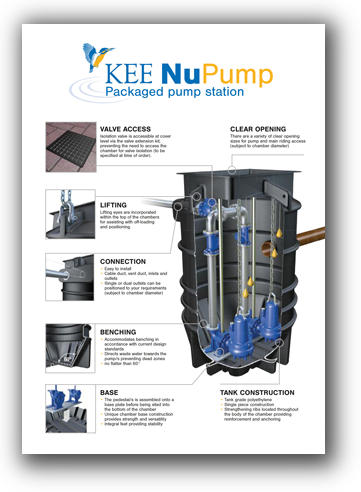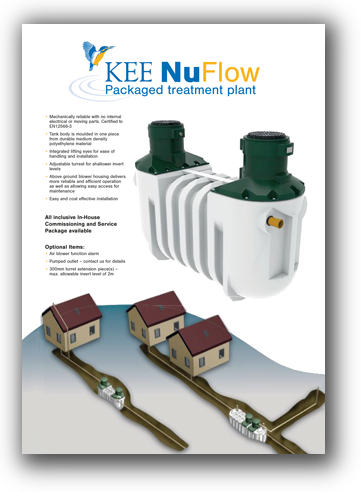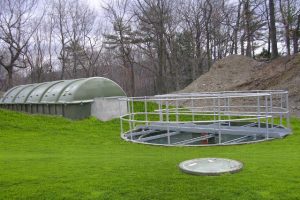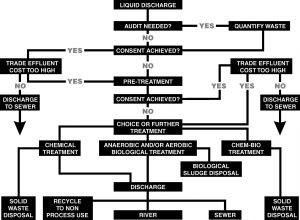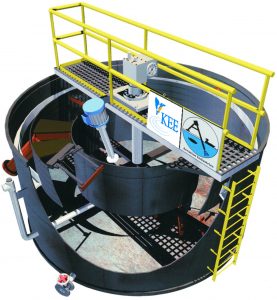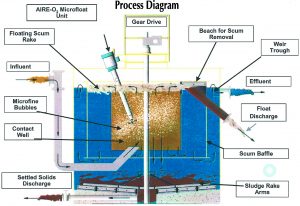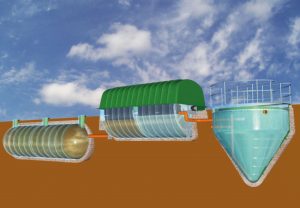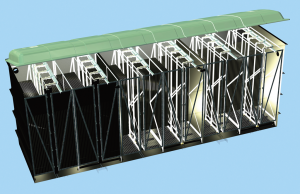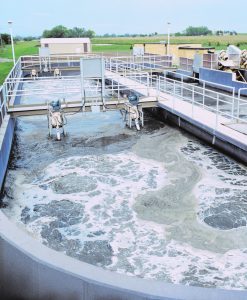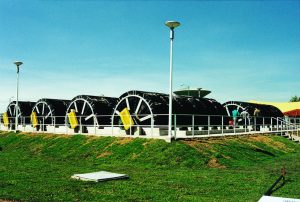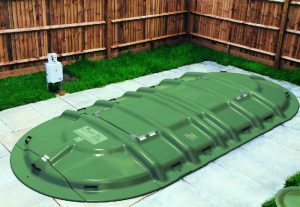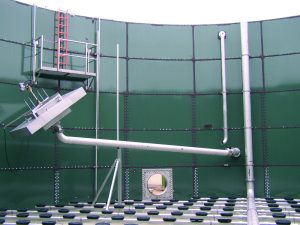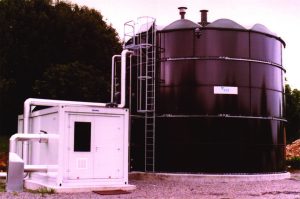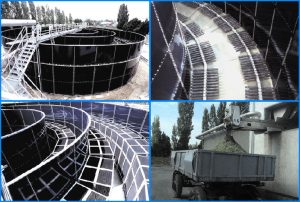Click on images below to view leaflets.
Tag Archives: wastewater treatment plants
KEE is protecting the environment with two NEW wastewater treatment product ranges
For applications up to a population equivalent of 50
KEE NuPump:
This is a totally self-contained, covered, single piece packaged pump station fabricated in lightweight, corrosion-resistant and tough Tank Grade polyethylene, it is virtually silent and odour free.
The KEE NuPump is easy to install, with minimal site work and is suitable for small to medium flows of up to population equivalent of 50 in single-piece configuration.
Extremely low power demand and low maintenance costs, together with longevity ensure a lowest lifetime cost.
KEE NuFlow:
This is a totally self-contained, covered, single piece packaged treatment plant fabricated in moulded one-piece durable medium density polyethylene material, corrosion-resistant. it is silent and odour free.
The KEE NuFlow is easy to install, with minimal site work and is suitable for small to medium flows of up to population equivalent of 50 in single-piece configuration.
Mechanically reliable with no internal electrical or moving parts therefore low maintenance costs, together with longevity ensure a lowest lifetime cost.
For further details call 01296 634500
E: sales@keeprocess.com W: www.keeprocess.com
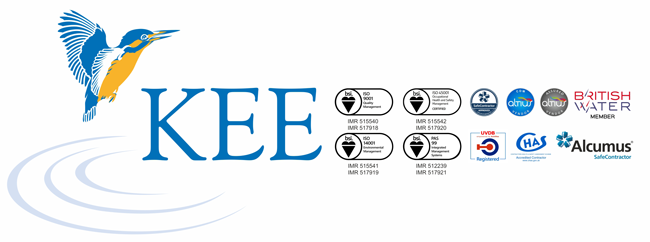
‘Out with the Old and in with the NuDisc’ at RSPB Headquarters, Bedfordshire
This month the RSPB have a shiny new KEE Wastewater Treatment Plant installed. This replacement KEE NuDisc® 20HR model and Twin Pump Station replaces their old G7 BioDisc Unit and Pump Station. The old plant was no longer suitable for their headquarters in Sandy due to the increasing staff numbers based on site and visitors attending the nature reserve.
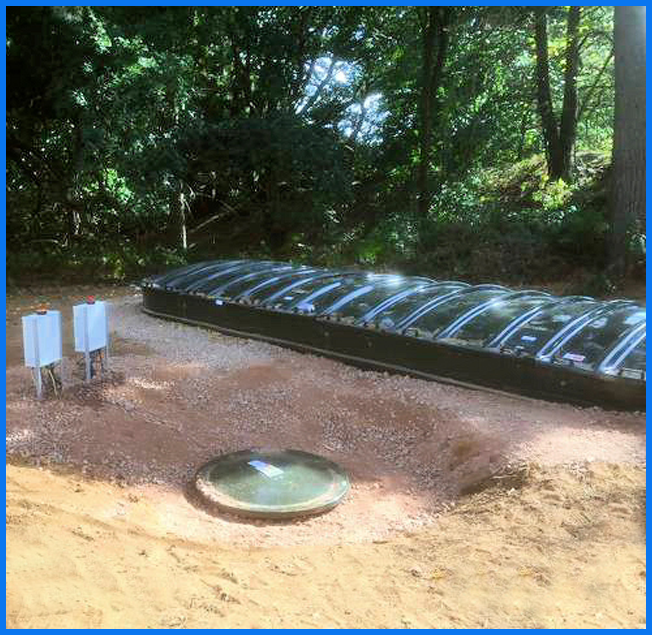
The KEE NuDisc 20HR and Twin Pump Station that replaces the old BioDisc
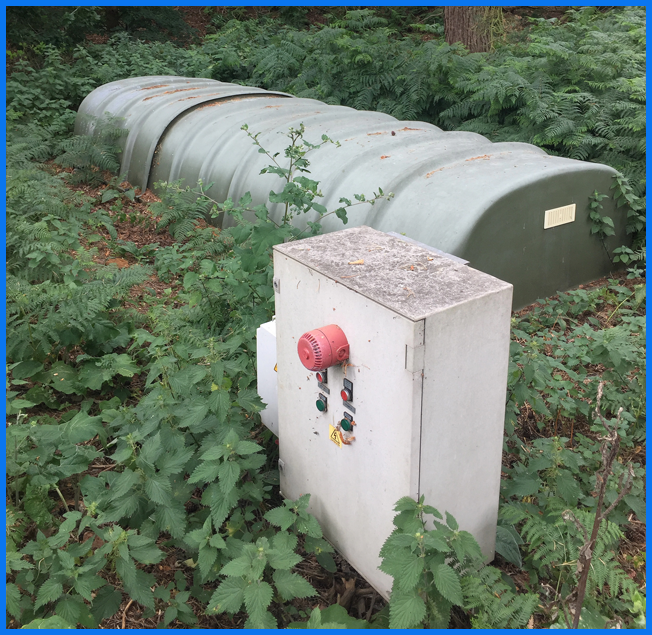
The old G7 BioDisc that’s no longer fit for purpose
For more information on KEE’s Wastewater Treatment Plants, or potential existing plant refurbishments or upgrades, please visit our KEE Process website or call us on 01296 634500
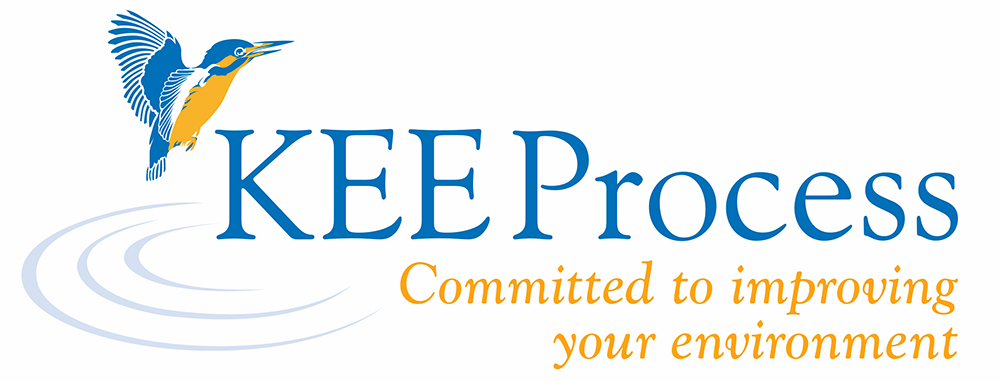

Over the years, KEE Process Limited has produced and delivered numerous Wastewater Treatment Plant projects in Northern Ireland and Ireland, using local M & E contractors.
In the Republic of Ireland and Northern Ireland many of KEE’s projects have been using local M & E contractors who offer total supply and installation packages to clients, with fully comprehensive after sales support. Some of these projects include plant built for the following sites:
1. Large Hotel, Co. Wicklow.
The hotel already had a wastewater treatment plant but they decided to build a new 40-bedroom lodge on site and therefore needed a plant to treat all the existing flows plus the flow from the planned expansion. The main requirements of the client were:
The final effluent required Total Nitrogen and Phosphorus reduction and needed to consistently comply with the onerous discharge license of BOD < 20 mg/l, SS < 30 mg/l, COD < 80 mg/l, NH4-N < 20 mg/l, NO3-N (Nitrate Nitrogen) < 5 mg/l, Phosphate as PO4 < 12 mg/l, FOG (fat, oil and grease) < 20 mg/l and Detergent (MSAS) < 1 mg/l.
The plant was to have low operational and maintenance costs.
The plant supplier was to be able to provide complete service to include planned preventative and emergency maintenance, process and operation maintenance and effluent sampling.
The KEE’s proposal included supply, delivery, installation and commissioning of a 60m3 primary settlement tank, Module DC16 Rotating Biological Contactor and ST6 hopper bottom GRP final settlement tank. All this equipment was factory built and delivered to site ready for installation on concrete slabs.
This plant was installed and commissioned in 2003. It has operated extremely well mechanically and has delivered excellent process performance since start-up. The total electricity costs for the plant is less than EUR1,000 per annum.
2. Golf Club, Co. Cork
This was a design and build turnkey contract and KEE who were process partners in the project. The discharge license was direct to the watercourse and specified a BOD < 20 mg/l, SS < 30 mg/l, NH4-N < 20 mg/l & Phosphate as P < 2 mg/l.
KEE supplied their compact single piece NuDisc® Model 1200.
3. Golf Club, Co. Dublin
During the refurbishment of the clubhouse, on-site sewage treatment plant and disposal systems were required. The discharge license specified a BOD < 20 mg/l, SS < 30 mg/l & NH4-N < 10 mg/l, NO3-N (Nitrate Nitrogen) < 15 mg/l, Phosphate as PO4 < 5 mg/l and FOG (fat, oil and grease) < 10 mg/l.
KEE Process Ltd designed the process and supplied and installed a single-piece compact packaged plant NuDisc® F13N with inbuilt de-nitrification stage and phosphate removal stage.
This contract also included the design and installation of an inlet pumping station and a sub-surface percolation area.
4. County Council, Ireland
This was an installation for a municipal treatment works for a Southern Ireland County Council for 1000 PE. The flow to the works are combined with surface water and municipal wastewater with a discharge license for BOD < 20 mg/l and SS < 30 mg/l.
KEE supplied their packaged modular treatment system and the contractor led the contract for installation and commissioning.
For more information on our Wastewater Treatment Technologies, please phone on 01296 634500 or visit our KEE Process Website.
Private Residential Golfing Community in New York State Selects KEE Process Managed Flow® Wastewater Treatment Process
Bristol Harbour is a private residential golfing community in the Western Finger Lakes of New York State, USA.
Having experienced ongoing problems with their existing wastewater treatment plant, the community approached KEE Process Limited’s North American partner, Waste Water Solutions International Inc., for help.
After suffering regular mechanical failures, deviations in effluent performance and high operating costs, the community recognised the need to upgrade their aeration plant. The new system would also need to cope with the planned expansion of the development and meet the State Law’s stringent treatment requirements.
The KEE Process Managed Flow® Process was selected because of its ability to continually produce high quality effluent and its low operator costs and maintenance. The system was also ideal for the site’s limited space and environmentally sensitive location.
To provide flexibility two streams were installed. The technology chosen included:
- A balancing tank
- KEE Process Managed Flow Rotating Biological Contactor (RBC) – Model DN-19-S
- KEE Process Final Settlement Tank (Model ST9) with automatic pump assisted sludge return system and gravity sand filter with backwash capability.
This technology was designed and specified to provide for the current and future expansion of the community.
The KEE Process Managed Flow RBC Model DN-19-S and a KEE Process Final Settlement Tank Model ST9 with automatic pump assisted sludge return system and gravity sand filter with backwash capability installed at the Bristol Harbour private residential golfing community in the Western Finger Lakes of New York State, USA.
For more information on our Wastewater Treatment Technologies, please phone on 01296 634500 or visit our KEE Process Website.
Industrial Wastewater Disposal and Treatment Options – Back to Basics – A Practical Approach from KEE Process Limited
What are the Options
Brewing, winery, soft drinks manufacture, food preparation production and packaging (baking, ready convenience meals, abattoir, meat, poultry and vegetable), dairy (milk processing, cream, cheese and yoghurt production), commercial laundries, pharmaceutical, petrochemical and many other industries are large users of water. This results in large quantities of heavily polluted wastewater for disposal.
UK Water companies and the public bodies responsible for collection, drainage and treatment of wastewater have strict controls on the quantity and the quality of industrial and trade wastewater being discharged into public sewers. Legislation supports them in this. Direct discharge to a watercourse is even stricter and is normally monitored by the National Environmental Agencies and the Environment Agency in the UK. Penalties for transgression can include prosecution, fines, financial loss and can, in some cases, prohibit operations.
Audits
It is always advisable to carry out an evaluation of the processes involved in the core business of an organisation to identify sources of wastewater. An audit would help reduce waste/wastewater and disposal costs, quantify flow rates, solids and organic loads and characterise the wastewater to provide the necessary data for analysing the available disposal options and optimise the design of any on-site treatment plant.
It is useful to be subjective when carrying out an audit to ensure that good housekeeping practices are identified to reduce unnecessary waste which would add to the costs of disposing wastewater generated on site. Process audits should be aimed at identifying the waste, excess use of water and energy. Simple actions, such as installations of energy-saving devices or taps and hose controls and careful disposal of solid waste, can produce both financial and environmental benefits. It would also help to reduce the size of an on-site treatment plant if one was planned and this would result in capital cost savings.
An audit would lead to evaluation of volumetric and organic mass loads for design purposes and would aid in characterising the nature of the waste, to optimise the design for on-site treatment plants.
Public Sewer or Watercourse
Public sewers are convenient for disposal if nearby. Quantity, strength and characteristics of the wastewater need to be considered and consented by Authorities or the Water Company in the UK. If approval is granted and the wastewater meets the criteria set, then sewer disposal would be an obvious choice, but this comes at a cost. High COD (Chemical Oxygen Demand) and suspended solids would lead to high costs in discharging to sewer and reducing these parameters could make significant savings. Partial or full onsite treatment would bring about cost savings to sewer discharge but needs justifying through quantification.
Hygiene versus Convenience
With the food processing, beverage and dairy industry, hygiene is of paramount importance. On-site wastewater treatment may be perceived by management as presenting problems although the risks are small. It is vital that the Operatives normally involved in the process part of the industry, do not need to visit the wastewater treatment plant and the risks to main operation therefore are contained and the operation of the wastewater plant becomes one of non-core features. This can be achieved by having the treatment plant operation undertaken by the maintenance department of the industry or independent operators such as KEE Process Limited who would provide a turnkey solution for designing, supplying, installing and operating a plant for a Client.
Treatment Options: Physical, Biochemical or Combination of Both
Where the decision to treat on-site has been made, the appropriate choice of plant has to be determined. Whether partial treatment or full treatment is installed is usually a matter of economics. A capital outlay is necessary and this must have an acceptable payback period. The treatment options available are Physical, Physical/Chemical, Biological or a combination of all or any of these.
On-site treatment could involve simple physical treatment to remove materials such as gross solids, FOG (Fat, Oil & Grease) and can include pH correction. The equipment may include manual or mechanical screens, grease separators or the newly introduced DISPERSED AIR FLOATATION which is simple, economical and extremely efficient and effective. A component of COD associated with these materials would also be removed by the physical treatment. With DISPERSED AIR FLOATATION up to 30% BOD, 50% COD, 60% TSS and over 90% FOG can be removed physically without the use of chemicals. Better performance can be achieved by using coagulant, flocculants and ploy-electrolytes. In most cases, partial treatment using DISPERSED AIR FLOATATION would achieve the reduction in pollution loads necessary to substantially reduce the cost of discharge of effluent to public sewer. The ownership costs (capital expenditure, servicing, maintenance and operation costs) associated with DISPERSED AIR FLOATATION are usually low. The benefits of cost savings in effluent disposal are high and the capital/operating cost of proving on-site partial treatment can be justified against the ownership costs. Given these benefits it may be sufficient not to invest in further onsite treatment for the effluent to be discharged into public sewer.
However, it may still be necessary or even desirable for the wastewater to be treated further for direct discharge to a watercourse or re-used for non-process operations within the industry. In such a case, full on-site treatment would often justify the capital and operations cost. Cost analysis must also take into account the valuable space required for location of the treatment plant on the core business site.
For disposal to watercourse, consent from the Environmental Regulating Authorities (the Environment Agency in the UK) will be necessary.
KEE Microfloat Unit Interior working of the Microfloat System
The full treatment options could include anaerobic fixed film technology. This is particularly suitable for high strength wastewater requiring initial partial treatment prior to sewer disposal or further aerobic treatment to produce effluent suitable for direct discharge to a watercourse. The aerobic process could include:
- Suspended Growth Activated Sludge Process options through Extended Aeration, Sequencing Batch Reactor (SBR) or Oxidation Ditch.
- Fixed Film Process through Rotating Biological Contactors (RBC), Submerged Aerated Filter (SAF).
Choosing the Treatment Option
The most suitable process selection would depend on many factors such as:
- Initial Mechanical/Electrical Capital Cost.
- Installation Cost.
- Operating Cost including on-site attendance/labour costs, energy costs, consumables and plant operation complexities. Disposal costs of physically separated pollutants e.g. FOG, TSS and sludge in case of full Biological treatment plant.
- Servicing, Spares & Maintenance Cost.
- Space and Land requirements for location of the on-site treatment plant.
All the above factors should be taken into account and a discounted cash flow calculated on a 10, 15 or a 20-year replacement cycle. This should be weighed against the cost of disposal to sewer or partial treatment followed by disposal to sewer. When evaluating the disposal costs to public sewer, it is necessary to liaise with the authorities or provider of the central wastewater treatment plant, to establish initial capital cost contribution expected and the potential annual costs associated with sewer discharge over the next 10,15 or 20 years. Armed with all this financial data, the overall cost of various disposal options should be evaluated and the financial disposal option chosen justified on a payback period or the net discounted cash flow, or the simple approach of evaluating the cost of disposing a unit volume (say 1 m3) of effluent.
With so many factors to consider, such as type of treatment, if any, the process selection for partial or full on-site treatment and cost analysis to justify the most appropriate option for disposal of the effluent, it may be beneficial to use the services of a professional. An experienced independent consultant with a wide knowledge of industrial wastewater treatment processes would be the obvious choice. Some Companies do offer a wide spectrum of process options and have the necessary experience to offer turnkey solutions using the most optimised process. Such companies may have a bias towards their own technology and process if they have a limited range of process options to offer. All this should be balanced against their ability to provide project management, process design, site civil work, mechanical/electrical erection, commissioning and more importantly on-site operation with process warranties.
The KEE Group Companies, KEE Process Limited and KEE Services Limited can offer such an option. Their technologies include physio-chemical processes (Dispersed Air Floatation, simple gravity solids and grease separators), Anaerobic Reactors (for high strength wastewaters), Fixed Film (RBC and SAF) Reactors and Suspended Growth Reactors (Activated Sludge Processes such as Extended Aeration, SBR, Oxidation Ditch, Extended Aeration followed by Ultra fine Filtration), and on-site operation of the treatment plant. KEE also have a team of experienced process engineers and project engineers capable of delivering the necessary turnkey solution to suit most customers. KEE Services offer on-site plant operation with out-of-hours emergency backup through a 24hrs manned Call Centre.
RBC Modular System
Photographs showing SAF, RBC, & SBR plants below:
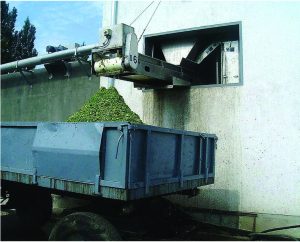
Vegetable processing wastewater screening prior to being treated in a multi-stage Submerged Aerated Filter Plant.
For more information on KEE’s latest NuDisc® RBC, please visit our website or call KEE Process on: 01296 634500
KEE Parts and Service, Maintenance and Operation
KEE Services Limited Online Shop for WwT Plant spares
KEE Services Ltd – offers maintenance, breakdown services and plant operation for all types of treatment plant and pumping equipment, from all manufacturers. KEE technicians are trained in long-term servicing and look after 8,000 installations in the UK. KEE also operate ‘out-of-hours’ 24 hour call centre.
KEE Wastewater Treatment Systems can be configured for BOD removal and/or nitrification and/or de-nitrification and can include a built-in or modular physical-biological tertiary filter. UV disinfection can also be included into the packaged plant to enable non-portable water re-use.
KEE PROCESS LIMITED and KEE SERVICES LIMITED –
KEE is a globally recognised brand operating within in the industrial, commercial and domestic wastewater treatment industries. KEE’s specialist knowledge and expertise is derived from over 60 years’ experience in the design, development, manufacture, install, commissioning, operation, refurbishment, repair and maintenance of wastewater treatment systems and equipment, including:
- Fixed Film Reactors: Rotating Biological Contactors (RBCs), Packaged RBC Systems, Moving Bed Biological Reactors (MBBR) and Submerged Aerated Filters (SAF).
- Suspended Growth Reactors: Extended Aeration, Sequencing Batch Reactor (SBR), Oxidation Ditch, IFAS process technologies and Anaerobic Biological Reactor (ABR) for high strength industrial waste.
- ‘Turn Key’ Solutions: Technical Design, Project Appraisal & Management, Process Engineering, Plant Installation & Operation, Equipment Refurbishment & Upgrades and Plant Rental. KEE also provide approved spares and ancillary products such as Final Clarifiers and Settlement Tanks.
KEE Services Ltd specialise in maintenance & repair services for all makes and types of wastewater treatment systems & pumping stations. Our nationwide team of directly employed, regional engineers and technicians are KEE trained, DBS checked and British Water Certified.
KEE Bio-Guard, the biological solution against Fat, Oil and Grease (FOG).
The Biological Solution against Fat, Oil and Grease.
To maintaining a clear water flow from Fat, Oil and Grease KEE Bio-Guard ensures:
- Prevention of unpleasant odours
- Elimination of expensive call-outs
- Free running drains
- Conformity with effluent discharge regulations
- An environmentally friendly response to pollution
- Peace of mind.
KEE Bio-Guard is a long-lasting solution which needs little further maintenance. Completely biodegradable, and is safe to use in the kitchen environment
KEE Bio-Guard is the biological alternative to prevent blocked drains, offensive smells and maintenance of grease traps.
KEE Wastewater Treatment Systems can be configured for BOD removal and/or nitrification and/or de-nitrification and can include a built-in or modular physical-biological tertiary filter. UV disinfection can also be included into the packaged plant to enable non-portable water re-use.
KEE PROCESS LIMITED and KEE SERVICES LIMITED
KEE is a globally recognised brand operating within in the industrial, commercial and domestic wastewater treatment industries. KEE’s specialist knowledge and expertise is derived from over 60 years’ experience in the design, development, manufacture, install, commissioning, operation, refurbishment, repair and maintenance of wastewater treatment systems and equipment, including:
- Fixed Film Reactors: Rotating Biological Contactors (RBCs), Packaged RBC Systems, Moving Bed Biological Reactors (MBBR) and Submerged Aerated Filters (SAF).
- Suspended Growth Reactors: Extended Aeration, Sequencing Batch Reactor (SBR), Oxidation Ditch, IFAS process technologies and Anaerobic Biological Reactor (ABR) for high strength industrial waste.
- ‘Turn Key’ Solutions: Technical Design, Project Appraisal & Management, Process Engineering, Plant Installation & Operation, Equipment Refurbishment & Upgrades and Plant Rental. KEE also provide approved spares and ancillary products such as Final Clarifiers and Settlement Tanks.
KEE Services Ltd specialise in maintenance & repair services for all makes and types of wastewater treatment systems & pumping stations. Our nationwide team of directly employed, regional engineers and technicians are KEE trained, DBS checked and British Water Certified.
KEE Primary and Final Settlement Tanks
Primary and Final Settlement Tanks
GRP Hopper Bottom Settlement Tanks – KEE produce a wide range of Structural or Semi-structural Hopper Bottom GRP Settlement Tanks for small wastewater treatment plants.
KEE Wastewater Treatment Systems can be configured for BOD removal and/or nitrification and/or de-nitrification and can include a built-in or modular physical-biological tertiary filter. UV disinfection can also be included into the packaged plant to enable non-portable water re-use.
KEE PROCESS LIMITED and KEE SERVICES LIMITED
KEE is a globally recognised brand operating within in the industrial, commercial and domestic wastewater treatment industries. KEE’s specialist knowledge and expertise is derived from over 60 years’ experience in the design, development, manufacture, install, commissioning, operation, refurbishment, repair and maintenance of wastewater treatment systems and equipment, including:
- Fixed Film Reactors: Rotating Biological Contactors (RBCs), Packaged RBC Systems, Moving Bed Biological Reactors (MBBR) and Submerged Aerated Filters (SAF).
- Suspended Growth Reactors: Extended Aeration, Sequencing Batch Reactor (SBR), Oxidation Ditch, IFAS process technologies and Anaerobic Biological Reactor (ABR) for high strength industrial waste.
- ‘Turn Key’ Solutions: Technical Design, Project Appraisal & Management, Process Engineering, Plant Installation & Operation, Equipment Refurbishment & Upgrades and Plant Rental. KEE also provide approved spares and ancillary products such as Final Clarifiers and Settlement Tanks.
KEE Services Ltd specialise in maintenance & repair services for all makes and types of wastewater treatment systems & pumping stations. Our nationwide team of directly employed, regional engineers and technicians are KEE trained, DBS checked and British Water Certified.
KEE Dispersed Air Flotation Systems (DAF)
Dispersed Air Flotation Systems
KEE Microfloat® Dispersed Air Floatation Technology – for pre-treatment of industrial and food processing wastewater to reduce FOG, BOD, COD & SS. The KEE Microfloat® system produces extremely fine bubbles (10µm to 50µm air bubbles without the use of a high-pressure pump, pressure vessel and venturi) into the water to float the light fractions.
KEE Wastewater Treatment Systems can be configured for BOD removal and/or nitrification and/or de-nitrification and can include a built-in or modular physical-biological tertiary filter. UV disinfection can also be included into the packaged plant to enable non-portable water re-use.
KEE PROCESS LIMITED and KEE SERVICES LIMITED
KEE is a globally recognised brand operating within in the industrial, commercial and domestic wastewater treatment industries. KEE’s specialist knowledge and expertise is derived from over 60 years’ experience in the design, development, manufacture, install, commissioning, operation, refurbishment, repair and maintenance of wastewater treatment systems and equipment, including:
- Fixed Film Reactors: Rotating Biological Contactors (RBCs), Packaged RBC Systems, Moving Bed Biological Reactors (MBBR) and Submerged Aerated Filters (SAF).
- Suspended Growth Reactors: Extended Aeration, Sequencing Batch Reactor (SBR), Oxidation Ditch, IFAS process technologies and Anaerobic Biological Reactor (ABR) for high strength industrial waste.
- ‘Turn Key’ Solutions: Technical Design, Project Appraisal & Management, Process Engineering, Plant Installation & Operation, Equipment Refurbishment & Upgrades and Plant Rental. KEE also provide approved spares and ancillary products such as Final Clarifiers and Settlement Tanks.
KEE Services Ltd specialise in maintenance & repair services for all makes and types of wastewater treatment systems & pumping stations. Our nationwide team of directly employed, regional engineers and technicians are KEE trained, DBS checked and British Water Certified.
